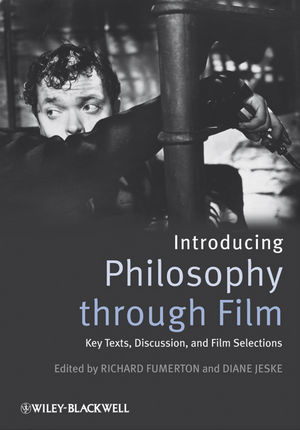Introducing Philosophy Through Film: Key Texts, Discussion, and Film SelectionsISBN: 978-1-4051-7102-1
Hardcover
640 pages
April 2009, Wiley-Blackwell
 Other Available Formats: Paperback
|
||||||
Source Acknowledgments
Part I: Introduction: Philosophical Analysis, Argument, and the Relevance of Thought Experiments
Films: Monty Python, "The Argument Skit"; Pulp Fiction; Seinfeld episode: The Soup
Part II: The Problem of Perception
Films: Total Recall; The Matrix; Star Trek TV episode: The Menagerie
Introduction
1. First Meditation and excerpt from Sixth Meditation: René Descartes
2. Some Further Considerations Concerning Our Simple Ideas of Sensation: John Locke
3. Three Dialogues Between Hylas and Philonous: George Berkeley
4. Of the Sceptical and Other Systems of Philosophy: David Hume
5. The Self and the Common World: A. J. Ayer
6. Brains in a Vat: Hilary Putnam
7. The Structure of Skeptical Arguments and its Metaepistemological Implications: Richard Fumerton
8. The Experience Machine: Robert Nozick
Part III: Philosophy of Mind
Films: What Dreams May Come; Bicentennial Man; Heaven Can Wait; The Sixth Day; The Prestige; Multiplicity; Star Trek TV episode: Turn About Intruder
Introduction
9. Second Meditation: René Descartes
10. Descartes’ Myth: Gilbert Ryle
11. Sensations and Brain Processes: J. J. C. Smart
12. What Is It Like to Be a Bat?: Thomas Nagel
13. What Mary Didn’t Know: Frank Jackson
14. Minds, Brains, and Programs: John R. Searle
15. Mad Pain and Martian Pain: David Lewis
16. Eliminative Materialism: Paul Churchland
17. Of Identity and Diversity: John Locke
18. The Self and the Future: Bernard Williams
19. From Reasons and Persons: Derek Parfit
20. A Dialogue on Personal Identity and Immortality: John Perry
21. On the Immortality of the Soul: David Hume
Part IV: EthicsA. Act Consequentialism and its Critics
Films: Abandon Ship!; Fail Safe; Dirty Harry; Sophie’s Choice; Saving Private Ryan; Judgment at Nuremberg; Minority Report: 24 (Season 3: 6.00–7.00 a.m.); Titanic; Vertical Limit
Introduction
22. Utilitarianism: John Stuart Mill
23. Groundwork for the Metaphysics of Morals: Immanuel Kant
24. What Makes Right Acts Right?: W. D. Ross
25. A Critique of Utilitarianism: Bernard Williams
26. An Outline of a System of Utilitarian Ethics: J. J. C. Smart
27. Intending Harm: Shelly Kagan
28. United States v. Holmes (1842)
29. The Queen v Dudley and Stephens
30. War and Massacre: Thomas Nagel
B. Obligations to Intimates
Films: The English Patient; Casablanca; The Third Man; The Music Box; High Noon; Nick of Time; 24 (Season 1: 7.00–8.00 a.m.)
Introduction
31. From Nicomachean Ethics: Aristotle
32. Self and Others: C. D. Broad
33. Filial Morality: Christina Hoff Sommers
34. Alienation, Consequentialism, and the Demands of Morality: Peter Railton
35. Relatives and Relativism: Diane Jeske and Richard Fumerton
36. Families, Friends, and Special Obligations: Diane Jeske
37. An Ethic of Caring: Nel Noddings
Part V: Philosophy of Time
Films: Somewhere in Time; Back to the Future; Planet of the Apes; Frequency; A Sound of Thunder
Introduction
38. Making Things to Have Happened: Roderick M. Chisholm and Richard Taylor
39. Space and Time: Richard Taylor
40. The Paradoxes of Time Travel: David Lewis
Part VI: Free Will, Foreknowledge, and Determinism
Films: Minority Report: The Boys From Brazil: A Clockwork Orange: The Omen: Compulsion: Law and Order ("black rage" defense), Season 5, Episode 69414, Rage (2/01/95)
Introduction
41. From De Interpretatione: Aristotle
42. Of Liberty and Necessity: David Hume
43. Meaning and Free Will: John Hospers
44. Determinism: J. R. Lucas
45. Freedom of the Will and the Concept of a Person: Harry G. Frankfurt
46. The M’Naghten Rules (1843): House of Lords
47. The Insanity Defense (1956): The American Law Institute
48. What Is So Special About Mental Illness?: Joel Feinberg
Part VII: Philosophy of Religion
Films: Jason and the Argonauts; Star Trek V: The Final Frontier; Dogma; YouTube: Mr Deity and the Evil
Introduction
49. The Wager: Blaise Pascal
50. The Ontological Argument: Anselm
51. The Cosmological and Design Arguments: William L. Rowe
52. Evil and Omnipotence: J. L. Mackie
53. Why I Am Not a Christian: Bertrand Russell



